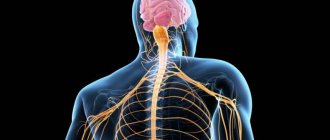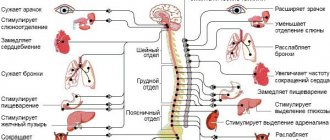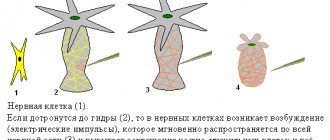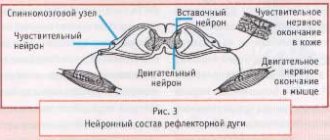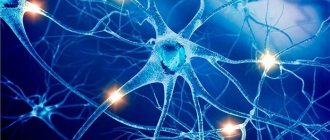Features of the nervous system
The psyche and body of the adze are interconnected. Any change in one system leads to changes in another. All this is reflected in the internal state. In neurology there is a separate direction - psychosomatics, with the help of which it is possible to establish a certain connection between mental reactions and their impact on human physiology.
As soon as a person becomes depressed or experiences stress, a protective reaction of the body immediately occurs - muscle tension. The body is constantly in tension, while the soul calms down. If such situations happen very rarely, then nothing harms the body.
But if this becomes regular, a psychosomatic illness may appear, which is difficult to identify. Physical ailments begin to actively manifest themselves, and the psychological causes are “deeply” hidden. As a result, doctors can spend years eliminating the effects without knowing exactly the main cause.
All processes inside the body occur smoothly and smoothly, controlled by the central nervous system. But if there is a chronic focus of excitation in the brain, which is caused by negative emotions, the nervous system no longer performs its main function.
When the body is left without a commander-in-chief, failures gradually occur that lead to the collapse of the unified system. The work of every organ is disrupted. As a result, a person develops diseases of the heart, stomach, etc. In addition, other ailments appear: poor appetite, insomnia, apathy, irritation, lack of interest in what is happening and in one’s life. In addition to the body, the psyche suffers. A feeling of anxiety and restlessness appears. From this observation it is clear why the nerves and psyche need to be strengthened. There are a huge number of special techniques for this, which are divided into 2 main groups: for the psyche and the body.
What's happening
In a systematic review, researchers report that 20-40% of coronavirus patients experience psychiatric disorders:
- insomnia - in 42% of patients
- impaired attention and concentration - in 38%
- anxiety - 36%
- memory impairment - 34%
- depression - 33%
- impaired consciousness - in 21%
- post-traumatic stress disorder - in 4-7%
Every fourth patient experiences severe headache and dizziness, 69% have psychomotor agitation, and 0.7% have seizures and movement disorders. Elderly people may develop delirium, a disorder of consciousness in which thinking, attention, and perception of the world around them are impaired. However, delirium most often occurs in older patients with dementia, a syndrome of cognitive decline. Sometimes this is their only symptom of coronavirus without any disturbances in the respiratory system.
“People with coronavirus infection often experience negative psychological reactions: an acute reaction to stress, depression, emotional disturbances, obsessions and dysphoria - a combination of gloomy mood and irritability,” says Olga Markina, candidate of psychological sciences, SberHealth consultant.”
A large-scale outbreak of coronavirus is not the first time in history. During previous epidemics, doctors observed depressed mood and anxiety in patients - the most common symptoms in the acute phase of intoxication that accompanies the disease. A small proportion of patients experience psychosis - an acute disorder of mental activity in which mental processes are desynchronized, the perception of the real world is disrupted, and behavior and emotional reactions do not correspond to the real situation.
“During illness, patients experience fear and anxiety,” neurologist and rehabilitation specialist at GMS Clinic Tigran Makichyan shares his experience. “This is due to many factors: media pressure, stories that someone you know has died, a rapid heartbeat that makes a person restless and anxious.”
Some patients also experience catatonia, a movement disorder accompanied by either complete stupor or increased agitation.
“Work experience shows that coronavirus infection, associated with intoxication and oxygen deprivation of the brain, can cause exacerbation of diseases of the neurological and psychiatric spectrum,” warns Olga Markina. — In older patients, emotional and intellectual impairment may worsen. COVID-19 can also cause a psychotic state: confusion, hallucinations and delusions. Episodes of anxiety-depressive disorder, panic attacks and obsessive-compulsive disorder occur quite often.”
If a person with a mental disorder is sick with coronavirus, then the infection and its treatment can trigger a relapse and worsen the course of the disorder. For example, medications for the treatment of COVID-19 can provoke psychosis in a patient with schizophrenia - delusions, hallucinations and inappropriate behavior, for example, the patient will think that medical staff are trying to infect him.
“Coronavirus leads to decompensation of all chronic diseases, including schizophrenia,” says Tigran Makichyan. “Against the background of hypoxia, when the brain does not have enough oxygen, patients become disoriented, but after recovery, as a rule, this goes away.”
Mental disorders are caused not only by the direct impact of infection on the brain, but by socio-psychological and economic factors associated with coronavirus. People associate a pandemic with instability and unpredictability. Quarantine, social restrictions, uninterrupted news flow about morbidity and mortality from COVID - all this affects the emotional state and mood of people. Thus, depression, anxiety, sleep disturbances, feelings of loneliness, depression and apathy can be caused by:
- high frequency of contact with infected people
- fear of infecting loved ones
- the need for physical distancing and wearing masks
- feeling of medical and social insecurity
- regular media reports about coronavirus
- lack of information about when the pandemic will end
A Chinese study demonstrates that the very fact of an outbreak of a virus pandemic is already affecting the mental state of people who have not contracted the coronavirus. Thus, approximately one in six, under the influence of the epidemic, developed symptoms of moderate and severe depression, and one in three developed signs of an anxiety disorder of moderate or severe severity.
In addition, some respondents reported symptoms of post-traumatic stress disorder and psychological distress. There are also reports that the pandemic is worsening mental health disorders in people who do not have coronavirus.
Covid affects not only the patient himself. It is reported that 50% of family members with a coronavirus patient experience symptoms of depression.
Body strengthening
To restore your body and mind, you need to follow simple tips:
- Physical activity has a positive effect on the body. Constant movement, sports and other physical activity have a positive effect on the condition of the body, and, consequently, the nervous system improves;
- control your diet. The body must receive the required amount of vitamins, minerals and other beneficial substances found in food products every day;
- rejection of bad habits. Despite the fact that many are accustomed to starting the morning with coffee and a cigarette, this habit should be forgotten. It’s better to completely give up all bad habits, such as alcohol, cigarettes, stimulants. The excitement that occurs due to receiving a dose of nicotine is quickly replaced by an inhibitory reaction;
- sauna and bathhouse. Such methods help cleanse the body and soul. Elevated temperatures and hot steam together help cope with many diseases, the body and nerves relax;
- harden. Water has a positive effect on the nervous system. If you harden yourself, you can strengthen your immune system. It invigorates and strengthens the body. There is a more extreme way to harden yourself - winter swimming. It may seem strange, but the health and calmness of walruses can only be envied. If you go down into an ice hole, your body will be very grateful;
- drink as much water as possible. Many people know the 8 glasses method. This is how much water a person should drink per day. This cleanses the body well, removing toxic substances;
- massage. A great way to get rid of many ailments and relieve stress. The body gradually loses its flexibility, the joints become less mobile. A good massage will speed up blood circulation and trigger metabolic processes.
Restoring physical condition after severe stress
You already know how to restore the body after prolonged stress, namely the psyche. Now let's talk about the heart, immunity and digestive system.
As we indicated earlier, recovery from prolonged stress is impossible without strengthening other body systems. Their treatment is a prerequisite if you want to completely eliminate the consequences of a stressful condition.
How to restore nerve cells after stress, how to replenish the body’s strength, improve memory and sleep?
The main thing you must do is improve your diet. This is an important condition for strengthening the digestive, immune and cardiovascular systems. It should be fractional (small portions 4-5 times a day) and contain a maximum of vitamins and beneficial microelements.
Remember about healthy sleep. To fully restore strength, the body needs at least 8 hours of rest.
Proper diet
Nutritionists have developed a special diet for those who want to stop being nervous and start enjoying life. If the body lacks potassium, calcium, magnesium, phosphorus and iron, then the nervous system and the entire body will suffer. It is especially important to ensure that the body receives the required amount of magnesium.
- You need to eat buckwheat, oat and wheat porridge more often.
- Phosphorus relieves muscle tension and stabilizes the functioning of the nervous system. The trace element is present in milk, cereals and beans.
- Calcium – regulates the functioning of muscles and nerves. Contained in milk, nuts and cabbage.
- Iron – contributes to the normal functioning of the thyroid gland, ensures normal metabolic processes. Present in seafood, river fish, fruits, green vegetables, baked goods.
- Potassium – normalizes the smooth functioning of nerves and muscles, prevents stress and nervous breakdowns. The lack of microelements can be compensated for by vegetables, fruits, lean meat and fish, and dried fruits.
How coronavirus affects the body
The more severe the acute phase, the more likely the severity and duration of post-Covid complications will be. Chinese colleagues who conducted a study on a very large material revealed statistics: even if you did not end up in the hospital, had a fairly mild course and outpatient treatment, then about 30% of these people still need rehabilitation. What can we say about people who have lung damage of 70% or more? About those who spent 45 days in intensive care?
The basis of the damage that the body receives after contact with the virus is the formation of blood clots. When blood clots get into the lung tissue, it is not exactly pneumonia, but rather pneumonitis, that is, these are small thromboses in the lung tissue. Blood clots can also form in the brain area, in which case the disease follows the pattern of a stroke. There may also be a skin lesion, and it is clear that this will manifest itself in a different way than coughing.
Similar consequences arise as a result of the impact of the virus on the blood system - homeostasis. We always have a balance between the system that clots the blood and the system that thins it. When the balance is disturbed, thrombus formation occurs more actively. Therefore, the main treatment for coronavirus infection is blood thinning drugs; they are prescribed to everyone. But the prescription of antiviral or antibiotics depends on the time of detection, time of admission to the hospital and other factors.
Treatment for a nervous breakdown
A calm, supportive conversation is essential for your state of mind at times like these. But nothing can replace professional help from a psychotherapist or psychiatrist.
Manifestations of a nervous breakdown or burnout syndrome should not be ignored!
Of course, if you are experiencing these sensations, then you need to consult a psychotherapist in person. You shouldn’t hope that everything will go away on its own without leaving a trace. This is wrong. The resulting nervous breakdown or burnout syndrome will not leave you on its own. It may temporarily lose the strength of its manifestation (symptoms will decrease), but with the slightest negative effect, it will manifest itself again, but with greater force, and then there is a high probability of the need for hospitalization. Hospitalization, due to burnout or a nervous breakdown, is always very painful for a person. Why take it to the extreme when this problem can be solved more painlessly and much faster by undergoing high-quality outpatient treatment for a nervous breakdown. Depending on the reasons for the formation, the treatment of a nervous breakdown is based.
Drug treatment for a nervous breakdown
People who have suffered a nervous breakdown often need to take medication.
In most cases, the use of nootropic drugs, vitamins, and amino acids is sufficient. Less commonly, the use of antidepressants, sedatives and other specific drugs used in the treatment of a nervous breakdown is required.
Many of these drugs are not intended for long-term and permanent use. Some of them can be addictive. That is why monitoring by a doctor is required constant and very attentive.
Antidepressants – These drugs are mainly used for depression. You should be careful when prescribing them, since some types of depressive conditions preclude the use of these drugs.
Anxiolytics - These drugs are mainly used to relieve anxiety. Some anti-anxiety medications can be addictive.
Antipsychotics - these drugs are used mainly in the treatment of serious nervous breakdowns and mental disorders with more profound disorders of the metabolic processes of the brain. Their use requires particularly careful diagnosis and special monitoring throughout the entire period of treatment.
Mood stabilizers - These medications are commonly used to treat mood disorders.
Nootropics, vitamins, amino acids are necessary for the restoration and nutrition of nervous tissue cells. Inappropriate prescriptions can also cause serious complications.
Aromatherapy, Yoga and Massage Therapy. — These therapeutic procedures complement the treatment. They are used to help the patient relax. The body and mind will be given relief from the ravages that constant agitation has had on them.
Psychotherapy for nervous breakdown
Psychotherapeutic treatment for nervous breakdown is often preferred by people. However, this is often not enough due to a deficiency of amino acids and other essential ingredients for the functioning of nervous tissue. This type of treatment is usually used to treat a nervous breakdown or burnout syndrome. It is recognized as an effective tool in helping patients overcome the underlying psychological problems that led to their breakdown.
Psychotherapy is most effective in the final stages of therapy and during the rehabilitation period.
Hypnotherapy for nervous breakdown
Hypnosis is used to achieve several goals. To help the patient relax and as a diagnostic procedure. Hypnosis can also be used to rewire the brain.
It should be noted that this technique has many different contraindications. This is due to the specific impact of the procedure on a person’s mental activity. Therefore, hypnotherapy should be prescribed with caution and in the absence of contraindications.
How to get out of a stressful situation
With severe stress, it seems that this state can consume you for a long time. Believe me, this is absolutely not true. There are several simple techniques to get rid of the unpleasant influence of irritants.
- Turn your thoughts into a positive direction. The cause of your stress needs to be presented in a funny, even ridiculous way.
- Take a break for 5 minutes. Move away from the voltage source for a short time. This will give you the opportunity to calmly breathe and pull yourself together.
- Don't raise your voice. No matter how much you want to scream, when you find yourself in a stressful situation, remain calm. You can scream and let off steam later, alone with yourself.
- Promise yourself a reward for endurance and patience. Waiting for a quick treat or something new will put you in a calmer and more peaceful mood.
Childhood trauma
Don't lose sight of the conditions and circumstances of your childhood. The cause of most of your problems lies there. Increased susceptibility to stress is an echo of too low self-esteem, which was formed at an early age.
When figuring out how not to worry about anything, try to understand that every person has the right to make mistakes. No one will reproach you or punish you for doing something wrong. Let go of the experiences of childhood and live now as an adult, accomplished person.
Changing the daily routine
How can you not worry about anything all day long? It’s very simple, add a few pleasant moments to your usual schedule. This will help you get distracted and get a good dose of positive emotions. They will help you cope with almost any stress.
- Breakfast should be delicious. Yogurt, natural, chocolate with tea, oatmeal with honey and dried fruits - it doesn’t matter what you start your day with, the main thing is that it brings you a feeling of happiness.
- Don't skip exercise, it gives you vigor and strength to withstand stress all day.
- Learn to distract yourself from unpleasant situations. At such moments, think about what brings you peace.
- In particularly difficult situations, look at the flowing water. Is there a river nearby? No problem, just a water tap is enough.
- Write down your concerns on paper. Then just tear it up and throw it away. Imagine throwing away your problems along with the scraps.
No need to feel sorry for yourself
Quite a lot of people, at the first signs of fatigue, give up and begin to complain about their problems with all their might. This behavior results in despondency and uncertainty consuming you entirely. Self-compassion is the body's response to any effort. Under no circumstances should you allow self-pity to manifest itself in any way.
You need to firmly believe that you will cope with all the tasks and questions that arise. It is worth forcing yourself not to be distracted by momentary impulses. Believe me, as soon as you divert your attention from the irritant, it almost immediately ceases to have any effect on you.
When to start treatment for a nervous breakdown
- You (suddenly) become overexcited - You sleep very little and poorly, there are sleep disturbances, your mood often changes, you speak at a rapid pace, you began to spend more in the store, make unnecessary, impulsive purchases, you feel confused thoughts, a feeling of inexplicable anxiety. All this can happen after you have been feeling depressed and sad for some time.
- There is a history of mental health problems and you feel you are sliding towards a mental disorder.
- You have thoughts of suicide
If you are concerned about someone else, then you really need to make sure that person gets professional help as soon as possible. It is necessary to immediately take measures to organize therapy. In such cases, the condition requires active therapy, which is best started in a hospital setting. After the condition has stabilized, it is better to transfer the person to home mode.
Don't invent problems
Many people tend to inflate a simple obstacle into a whole pile of insurmountable problems. As a result, they seek advice and help even for the simplest decisions. The development of self-esteem and independence suffers from this. Such people do not know how to set goals or go towards them. Inert and passive, for them life becomes dull and dull.
There is no need to try to find additional pitfalls in any situation. Excessive thinking leads to the fact that the brain begins to give you the most negative scenario for the development of the situation. As a result, you accept it as reality and are already set up for failure.
Why do we worry
The root of excessive sensitivity to what is happening lies in various reasons. Psychologists identify several main sources:
- Frequent exposure to stress in childhood and adolescence.
- Excessive parental care, which does not allow the development of protective mechanisms.
- Genetic predisposition to reduced stress resistance.
- Constant negative atmosphere at home, at work and in the company of friends.
Analysis and analysis of fears
To get rid of the constant worries that are so annoying every day, you need to do a lot of work on yourself. If you don’t do this, you will interfere with the lives of not only yourself, but also those around you. To live without worrying and without spending a lot of energy on stress, learn to deal with all your fears. Divide them into two lists: solvable and unsolvable.
Let's start with the problems that can be solved. If you understand that with due effort you can easily cope with them, then you should not waste your nerves worrying about this. Now let's look at another list. Ask yourself, can I change anything? And if the answer is no, then stop worrying about something that has nothing to do with you.
